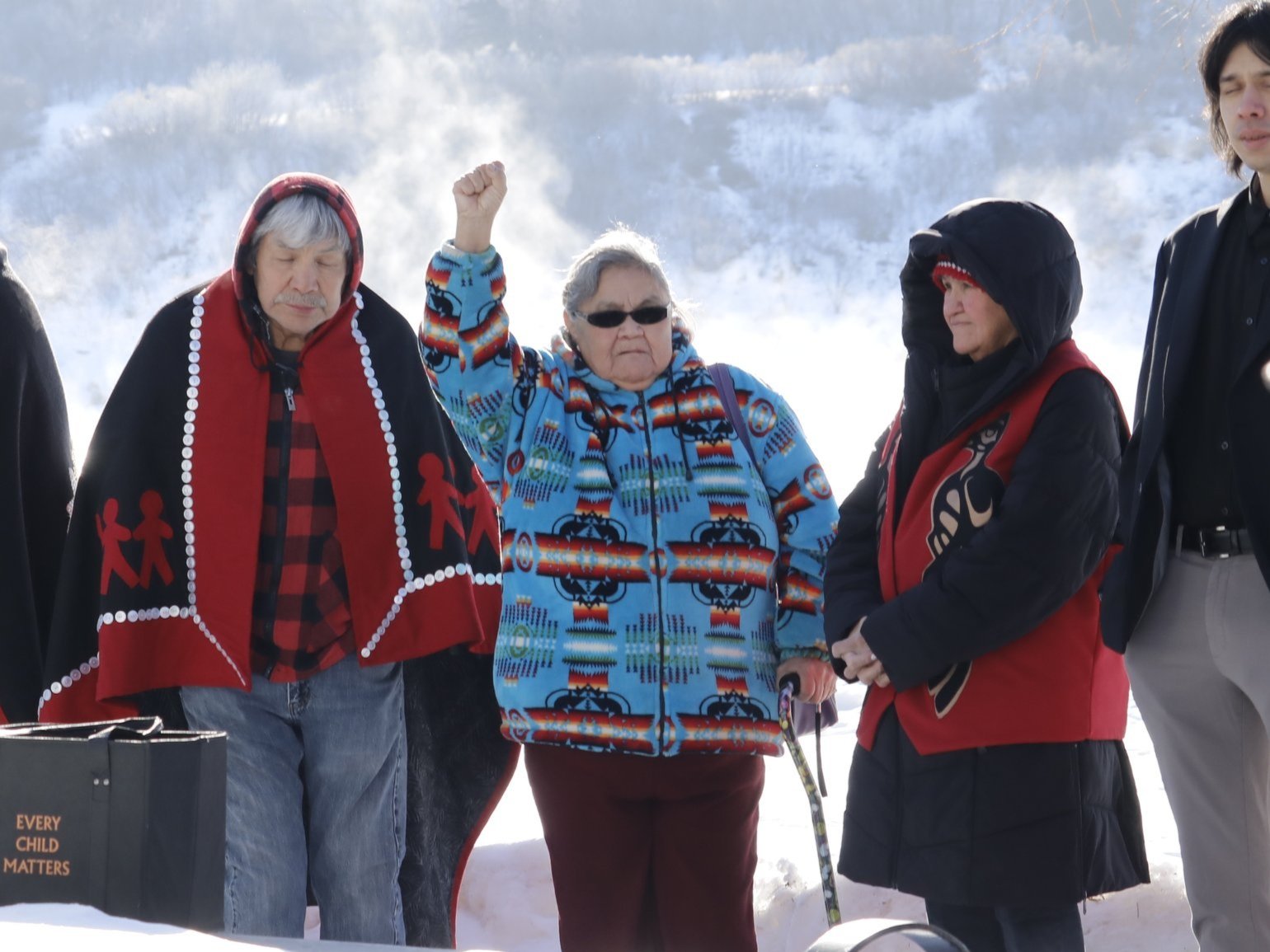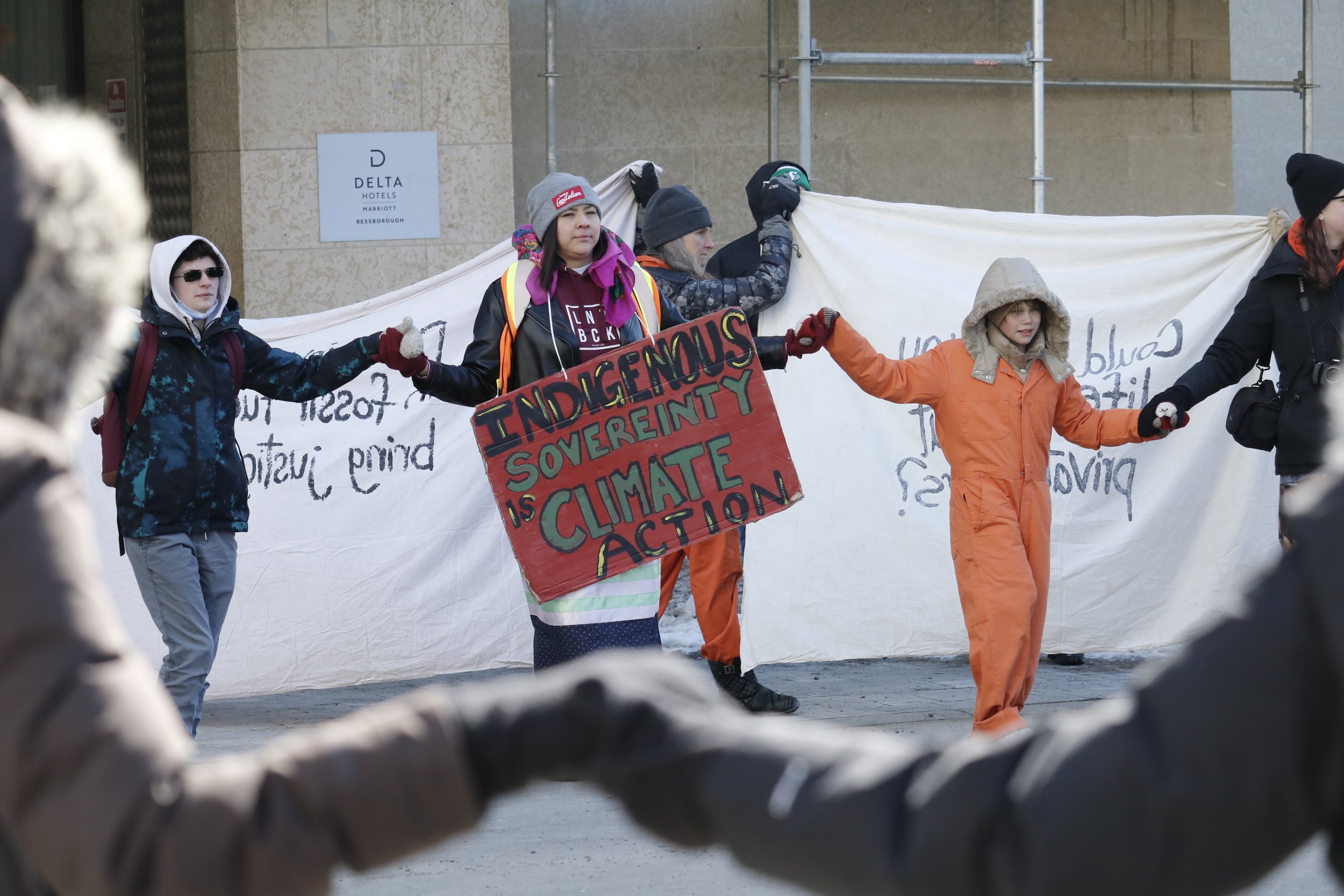No More Dirty Banks: Demanding Fossil Fuel Divestment & Indigenous Rights at RBC’s 2024 AGM
As the financial year-end approaches, ICA is gearing up to attend the Royal Bank of Canada (RBC) Annual General Meeting (AGM) on the ground to support Indigenous delegates April 11th on the of traditional territories of the Mississaugas of the Credit, the Anishnabeg, the Chippewa, the Haudenosaunee and the Wendat peoples.
You might recall our experience from last year, and the year before, RBC has continuously denied entry to the Wet’suwet’en Hereditary Chiefs while TC Energy senselessly clearcut and built the Coastal Gaslink (CGL) Pipeline through the sovereign, unceded territory also known as the Yintah.
In response to the increasing pressure and attention to RBC’s climate crimes, this major bank recently issued a so-called climate report committing to insignificant action for future investments in absolute emission reductions. This is a greenwashing tactic if not accompanied by restrictive fossil finance policies.
We are honored to stand in solidarity with delegates from the Aamjiwnaang, Wet’suwet’en, Gitxsan, Skeena Watershed Coalition, Keepers of the Water, Tsleil-Waututh Nation, Union of British Columbia Indian Chiefs (UBCIC), Giniw Collective and delegates coming from Louisiana who speak to the Liquified Natural Gas (LNG) impacts to Black and Indigenous communities across Turtle Island.
“Everyday there is harm caused to Indigenous communities by the projects RBC is financing, and the impacts on our health extend for decades and generations. This doesn’t change with some additional funding to renewables, and RBC needs to be accountable for the damage it is causing today. RBC will continue to face financial risk and opposition by financing projects that don’t have proper protocol and consent from Indigenous nations.”
RBC’s Hypocrisy and Greenwashing
We need to keep up the pressure on RBC because we know the company is feeling the pressure of our demands. RBC’s recent Climate Report announced their commitment to absolute emissions reductions targets through their financing. Yet, RBC remains the number one financier of fossil fuels in so-called Canada, and one of the worst fossil fuels financiers in the world, violating Indigenous rights internationally. Emission targets hardly meet the bare minimum, especially without a plan to phase out fossil fuel financing that upholds, affirms and respects Indigenous rights.
RBC Monopolizes Financial Freedom
So-called Canada’s economic system is built off the structural dispossession and oppression of Indigenous peoples from our inherent rights and duties to land.
Indigenous divestment from fossil fuels is about bringing the financial and social risks and impacts front and center within major banks’ financial accounting. The fossil fuel companies like RBC are financing have purposefully excluded environmental and social impacts of their operations, including chemical spills, climate change, and human and Indigenous rights abuses.
Sign held at RBC AGM outside rally, 2023.
The Indigenous divestment movement seeks to identify impacts and risks to be included in financial risk accounting for the fossil fuel industry and beyond. This includes creating new laws and policies that govern financial institutions so they must engage in genuine processes of Free, Prior, and Informed Consent, as defined by the United Nations Declaration of the Rights of Indigenous Peoples (UNDRIP).
Indigenous Rights Based Solutions
An Indigenous rights divestment framework seeks to not only divest from fossil fuel corporations and the financial institutions that fund them, but to assert Indigenous rights and sovereignty and Indigenous economies as a necessary alternative to the dominant capitalist colonial society.
Indigenous delegation and elders gather before march to RBC’s AGM, 2023.
Rally outside RBC’s AGM in April, 2023.
Join the Movement!
Now is the time to take action in your own communities, with your money. While RBC is holding their Annual General Meeting in so-called Canada’s finance capital, the impacts from their negligent investments are seen and felt worldwide. We’re calling on our relatives, allies, and supporters to stand in solidarity against banks like RBC that are violating Indigenous rights and fueling the climate crisis threatening the future that we must protect.
What you can do:
Follow ICA at RBC’s AGM, and stay up-to-date on our website here.
Divest your money from financial institutions that fund fossil fuel mining, exploration, and extraction, such as the BIG 5 (RBC, Scotiabank, TD, BMO, CIBC).
Read the Open Letter to RBC’s CEO. Sign, & share it here.
Uplift the voices and languages of Indigenous peoples—including sharing this blog!
Uphold Indigenous rights. Stop, not prolong, current exploitative and abusive economic and political systems.
Demand an end to fossil fuel extraction—a long time demand of Indigenous peoples—and to KEEP IT IN THE GROUND.
About the Author
Vanessa Gray is a queer Anishinaabe Kwe from the Aamjiwnaang First Nation. She is a water protector, environmental researcher, and community organizer for the Great Lakes region. Vanessa is a respected land defender emphasizing Indigenous peoples inherent and legal rights and sovereignty within climate justice. She continues to take part in a diversity of strategies, including calls on Concordia University to divest from fossil fuels, co-hosting Toxic Tours, and direct actions in solidarity with land defenders on Wet'suwet'en territory who continue to oppose the Coastal Gas Pipeline.
As a researcher, Vanessa is well known for her environmental justice work on pollution in Ontario’s Chemical Valley – a petrochemical hub on her territory and surrounding her community of Aamjiwnaang First Nation. She is the co-founder of Aamjiwnaang and Sarnia Against Pipelines (ASAP), Porcupine Warriors, and co-lead of the Environmental Data Justice (EDJ) Lab, which produces tools to visualize the relationship between colonialism, data, and pollution such as the Pollution Reporter App. Aamjiwnaang community member’s constant exposure to harmful emissions results in some of the highest mortality rates for cancers and respiratory diseases in Ontario. Vanessa has dedicated her life to challenging colonial violence and its impacts on environmental health.




